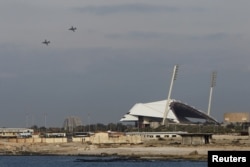U.S. lawmakers have expressed concern that the Obama administration may not be engaged enough in countering what they view as Russia’s bad behavior in Ukraine and Georgia.
“I worry that the message that [Russian President Vladimir] Putin must be taking from our response is that his limit-testing aggression and opportunism is the right approach,” said Democratic Senator Bob Menendez.
At issue is Russia’s 2014 annexation of the Black Sea peninsula of Crimea and its support for separatists in eastern Ukraine.
Also in 2008, Russia intervened militarily in Georgia, later recognizing the breakaway republics of South Ossetia and Abkhazia as independent states.
“Why aren’t we more aggressively engaging in tools of diplomacy that can help us hopefully have Russia understand that there are consequences,” asked Menendez at a Tuesday Senate Foreign Relations Committee hearing.
Russia has paid a “steep price” for its aggressiveness, said State Department Assistant Secretary of European and Eurasian Affairs Victoria Nuland, through U.S. and multi-national sanctions.
Since Russia annexed Crimea from Ukraine, the U.S. and EU have imposed several rounds of asset freezes, travel bans and other penalties on Russia.
Separately, world powers have been urging both Russia and Ukraine to fully implement Minsk, a cease-fire accord designed to end fighting between Ukraine’s government and the country’s pro-Russian rebels.
This month, the EU is considering whether it will roll over its broad economic and targeted sanctions against Moscow for its involvement in Ukraine.
Nuland said the U.S. is “cautiously optimistic” the EU will extend the penalties.
In addition to sanctions, the U.S. is providing military assistance to Ukraine’s forces. Deputy Assistant Secretary of Defense Michael Carpenter said the U.S. is spending $335 million this year training and equipping Ukrainian forces.
But lawmakers question if the U.S. is doing enough to change Russia’s behavior.
“There is basically a lot of frustration by U.S. lawmakers,” said foreign government relations analyst Adam Ereli.
There is concern that Russia has “continued to wage war, violate borders, take over territories of other countries with very little price to pay,” he said.
The questions also come at a time when there is both cooperation and tension between the U.S. and Russia over efforts to defeat Islamic State militants in Syria.
Also, both countries are part of the International Syria Support Group. But U.S. officials say Russian backed Syrian airstrikes have mostly targeted rebels and not terrorists in Syria.
Response sought to Russian INF violations
Republican Senator John Barrasso questioned when the U.S.will “punish” Russia for violating the INF, a historic nuclear test ban treaty.
Washington has accused Moscow of breaking the Intermediate Range Nuclear Forces Treaty by testing ground launched cruise missiles.
Nuland told lawmakers the U.S. is engaged in discussions with Russia to try to bring it back into compliance and work with allies to put pressure on Moscow for the violations.
Military exercise raises tensions
The lawmakers’ questions come at a time of increased tensions between Russia and the U.S. and its Western allies over Tuesday’s launch of a NATO exercise in Poland.
The training mission is designed, in part, to reassure Central and Eastern European countries that have been concerned about Russia’s actions in nearby Ukraine.
Russia denounced the exercise, saying it does not “contribute to an atmosphere of confidence and security.”






